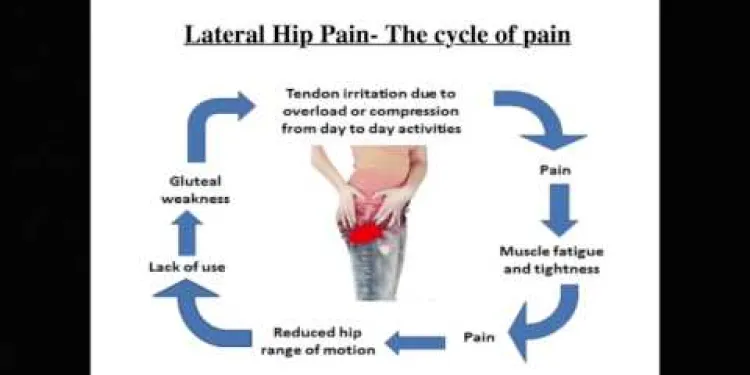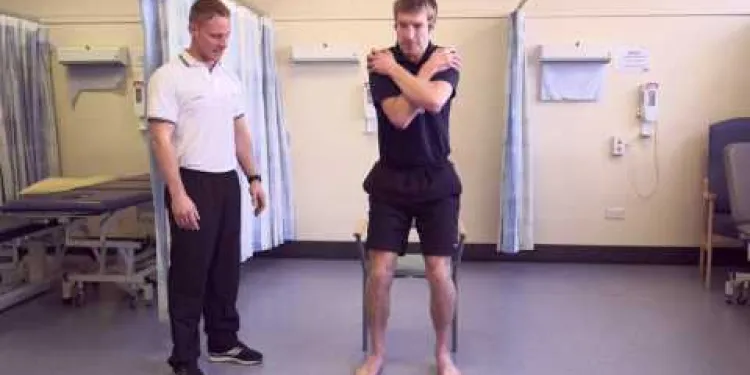Find Help
More Items From Ergsy search
-

A journey to hip surgery
Relevance: 100%
-

What is minimally invasive hip replacement surgery?
Relevance: 88%
-

What are the risks associated with hip replacement surgery?
Relevance: 87%
-

How do I prepare for hip replacement surgery?
Relevance: 86%
-

How long does a hip replacement surgery take?
Relevance: 85%
-

How much does hip replacement surgery cost in the UK?
Relevance: 85%
-

What type of anaesthesia is used during hip replacement surgery?
Relevance: 80%
-

Hip replacement
Relevance: 77%
-

What is a hip replacement?
Relevance: 74%
-

Total hip replacement
Relevance: 74%
-

Do I need a Hip Replacement?
Relevance: 73%
-

Total Hip Replacement
Relevance: 72%
-

Your anaesthetic choices for your planned hip or knee replacement surgery at the RUH.
Relevance: 71%
-

Enhanced Recovery - Hip
Relevance: 69%
-

Total hip replacement at Northumbria Healthcare
Relevance: 69%
-

Joint School - Hip Exercises
Relevance: 68%
-

Osteoarthritis of the Hip
Relevance: 67%
-

What is the recovery time for a hip replacement?
Relevance: 67%
-

Are there different types of hip implants?
Relevance: 66%
-

Osteoarthritis of the Hip
Relevance: 66%
-

Can both hips be replaced at the same time?
Relevance: 66%
-

Will I need physical therapy after a hip replacement?
Relevance: 64%
-

Hip replacement - getting into bed
Relevance: 63%
-

Having a hip replacement - Part Two: Recovery
Relevance: 53%
-

Advice - How to manage your lateral hip pain
Relevance: 53%
-

Exercises to help your lateral hip pain
Relevance: 53%
-

What can I expect during the first few weeks after hip replacement surgery?
Relevance: 50%
-

Same day discharge for NHS Golden Jubilee’s hip replacement patients
Relevance: 47%
-

Prostate Surgery
Relevance: 45%
-

NHS Faces Backlash Over Record-Breaking Surgery Waiting Times
Relevance: 44%
-

How long do hip replacement implants last?
Relevance: 42%
-

Lumbar surgery | NHS
Relevance: 42%
-

Weight Loss Surgery
Relevance: 42%
-

Will I be able to return to normal activities after hip replacement?
Relevance: 40%
-

Is surgery necessary for Crohn's disease?
Relevance: 40%
-

On the day of your cataract surgery
Relevance: 39%
-

Evidence-Based Interventions: haemorrhoid surgery
Relevance: 39%
-

When is surgery recommended for BPH?
Relevance: 39%
-

Experiencing delirium after surgery
Relevance: 38%
-

How do I know if my surgery is considered elective or urgent?
Relevance: 37%
A Journey to Hip Surgery
Understanding the Need for Hip Surgery
Hip surgery is often considered when chronic pain or hip dysfunction severely impacts quality of life. Common reasons for hip surgery include osteoarthritis, rheumatoid arthritis, hip fractures, and avascular necrosis. In the United Kingdom, such conditions can be prevalent among the elderly, athletes, and individuals with physically demanding jobs. Understanding the need for hip surgery begins with recognising the signs and symptoms, such as persistent pain, stiffness, and difficulty performing everyday activities.Consultation and Diagnosis
The journey to hip surgery typically starts with a consultation with your General Practitioner (GP). Your GP will evaluate your symptoms and medical history before referring you to an orthopaedic specialist. The specialist may request several diagnostic tests, such as X-rays, MRI scans, or CT scans, to assess the extent of the hip damage and determine the most suitable treatment options. Early and accurate diagnosis is crucial for effective treatment planning.Treatment Options and Pre-Surgery Preparation
Before considering surgery, less invasive treatments like physiotherapy, medications, and lifestyle changes may be recommended. If these measures prove ineffective, hip surgery might be the best option. Preparation for surgery involves pre-operative assessments, which include blood tests, heart and lung function tests, and discussions about anesthesia options. Patients are often advised to maintain a healthy weight, engage in pre-surgical exercises, and cease smoking to optimise the surgical outcome.The Surgical Procedure
Hip surgery can vary from minimally invasive arthroscopy to more extensive procedures like total hip replacement. The type of surgery will depend on the individual's specific condition and needs. During a total hip replacement, the damaged hip joint is replaced with artificial components. The surgery, typically lasting a few hours, is performed under general or spinal anesthesia. Modern advancements have significantly reduced recovery times and improved success rates.Post-Surgery Recovery and Rehabilitation
The recovery phase is crucial for a successful outcome. In the immediate post-operative period, pain management and wound care are critical. Physiotherapy plays a vital role in regaining mobility and strength. In the UK, the National Health Service (NHS) provides comprehensive post-surgical support and rehabilitation services, including tailored physiotherapy programs. Adhering to the rehabilitation plan and follow-up appointments ensures optimal recovery.Looking Ahead
With advancements in surgical techniques and prosthetic designs, hip surgery has become a common and successful intervention for those suffering from debilitating hip conditions. While the journey to hip surgery may seem daunting, understanding each step can help patients in the UK navigate the process with confidence. Successful hip surgery can significantly enhance quality of life, enabling individuals to enjoy pain-free mobility and engage in daily activities with ease.A Journey to Hip Surgery
Why Some People Need Hip Surgery
Sometimes, hips hurt a lot and don't work well. This can make it hard to do things we enjoy. Hip surgery can help. People might need hip surgery if they have: - Scary-sounding word like osteoarthritis. - Another big word: rheumatoid arthritis. - Broken hips (hip fractures). - A condition called avascular necrosis. Older people, athletes, or those with tough jobs in the UK may face these problems. It's important to notice symptoms like constant pain, stiffness, or trouble doing daily tasks.Seeing the Doctor to Find Out What's Wrong
The journey to hip surgery often starts when you visit your doctor, called a GP in the UK. The GP listens to you, checks your medical past, and may send you to a special doctor called an orthopaedic specialist. They might use special pictures called X-rays or MRI scans to look at your hip. Finding out what's wrong early is very important to help you feel better.How to Get Ready for Surgery
Before thinking about surgery, doctors might try other things first. These can be: - Special exercises called physiotherapy. - Medicine to help with pain. - Changing some parts of your daily life. If these don't help, surgery might be the next step. Getting ready for surgery means doing some tests like blood tests and talking about medicines to keep you asleep or happy during surgery. Doctors ask you to: - Eat healthy food to keep a good weight. - Do special exercises before surgery. - Stop smoking if you do.The Surgery
Hip surgery can be different for each person. Some might have a small surgery, while others might need a total hip replacement. In total hip replacement, the hurting part is taken out and replaced with new pieces. The surgery can take a few hours. You will sleep or be relaxed during the surgery. New and better ways to do surgery have made it so people get better faster.Getting Better After Surgery
Getting better after surgery is very important. Right after surgery, nurses help with pain and keep the area clean. Doing physiotherapy exercises helps your body get strong again. In the UK, the NHS helps take care of you afterward with special programs. Doing what the physiotherapy plan says and going to check-up visits helps you get better.Thinking About the Future
Hip surgery has gotten better and helps many people feel good again. Learning about the steps can help make you feel more confident. When hip surgery is successful, people can move without pain and enjoy daily activities.Frequently Asked Questions
What is hip surgery?
Hip surgery refers to procedures performed to address hip joint issues, including hip replacement or hip resurfacing, aimed at relieving pain and restoring function.
When is hip surgery necessary?
Hip surgery is typically necessary when other treatments like medication, physical therapy, and lifestyle changes have failed to relieve symptoms caused by conditions such as osteoarthritis, rheumatoid arthritis, or hip fractures.
How do I prepare for hip surgery?
Preparation includes medical evaluations, pre-operative tests, arranging for help during recovery, stopping certain medications, and following pre-surgery instructions provided by your healthcare team.
What are the different types of hip surgeries?
The main types include total hip replacement, partial hip replacement, and hip resurfacing. The choice depends on the specific condition and overall health of the patient.
What risks are associated with hip surgery?
Risks include infection, blood clots, hip dislocation, implant loosening, nerve injury, and complications from anaesthesia. Your surgeon will discuss these with you beforehand.
How long does hip surgery take?
Hip surgery usually takes between 1 to 2 hours, but this can vary depending on the specific procedure and the individual's condition.
Will I be awake during hip surgery?
No, you will either have a general anaesthetic, which puts you to sleep, or a regional anaesthetic such as spinal or epidural anaesthesia, where you are awake but numb from the waist down.
What is the recovery time after hip surgery?
Recovery time varies; most people can start walking with aids the day after surgery and can resume most activities within 6 to 12 weeks. Full recovery may take up to a year.
What kind of pain relief will I have after hip surgery?
Pain relief options include medications, ice packs, and physical therapy. Your doctor will tailor a pain management plan to your needs.
Can I live alone after hip surgery?
It is advised to have someone to help you during the initial weeks of recovery. Arrangements for home care or staying with family or friends can be beneficial.
When can I drive after hip surgery?
You can typically begin driving 6 to 8 weeks after surgery once you are no longer taking strong pain medication and can safely control the vehicle.
Are there activities I should avoid after hip surgery?
High-impact activities such as running, jumping, or contact sports should be avoided. Low-impact activities like walking, swimming, and cycling are generally safe.
Will I need physical therapy after hip surgery?
Yes, physical therapy is crucial for regaining strength and mobility. Your therapist will guide you through exercises to aid your recovery.
What are the signs of complications after hip surgery?
Signs include severe pain, swelling, redness, warmth around the hip, fever, or drainage from the surgical site. Contact your healthcare provider if you notice any of these symptoms.
How long will my hip implant last?
Hip implants can last between 15 to 20 years, sometimes longer, depending on the type of implant and the patient's activity level.
What is hip surgery?
Hip surgery is an operation on the hip. Doctors do this to help when the hip hurts or is not working well.
Doctors fix the hip so it can move better and hurt less.
Helpful tools like pictures or videos can make it easier to understand what happens during hip surgery.
Hip surgery is when doctors fix problems in the hip joint. This can include replacing the hip or fixing the surface of the hip joint. The goal is to stop pain and help the hip work properly again.
When do you need hip surgery?
People might need hip surgery when other things don't help. These other things could be taking medicine, doing exercises, or changing how they live. Surgery helps if someone has problems like worn-out or broken hips.
Getting Ready for Hip Surgery
Before surgery, you need to get ready. Doctors will check your health. You might need some tests. Ask someone to help you after surgery. Stop taking some medicines if your doctor says so. Follow the doctor’s instructions before your surgery. Tools like reminder apps can help you stay on track.
What are the different kinds of hip surgeries?
Here are some kinds of surgeries doctors can do on hips:
- Hip Replacement: This is when doctors take out the old, hurt part of the hip and put in a new one. It's like getting a new hip.
- Hip Resurfacing: This surgery smooths out the bone in the hip instead of replacing it. It's like fixing up the old part.
- Hip Arthroscopy: In this surgery, doctors use a small camera to look inside the hip and fix small problems. It's like using a tiny telescope.
- Hip Fracture Repair: This helps when a bone in the hip breaks. Doctors use screws and plates to hold the bone together so it can heal.
These surgeries help people move better and have less pain. If you find reading hard, you can ask someone to read with you. Audio books or talking apps can also help you understand better.
There are three main types of hip surgery:
1. **Total Hip Replacement:** The whole hip joint is replaced.
2. **Partial Hip Replacement:** Only part of the hip joint is replaced.
3. **Hip Resurfacing:** The surface of the hip joint is smoothed and covered.
The right type of surgery depends on how healthy you are and what your hip needs.
If you have trouble reading, you can try using audiobooks or ask someone to read with you.
What can go wrong with hip surgery?
When you have hip surgery, some things might go wrong. Here are a few things that can happen:
- You might get an infection. This is when germs make you sick.
- Your hip might not get better. It may still hurt or not work right.
- You could have a reaction to the medicine. This means the medicine could make you feel sick.
- Sometimes blood clots can happen. This is when blood gets thick and can block blood flow.
If you have questions or worries, it is good to talk to your doctor. They can explain things and help you understand.
Remember, using simple tools like reading out loud or using pictures can help you understand better.
There are some risks with this surgery. They are:
- Getting an infection (when germs make you sick).
- Blood clots (when blood gets thick and sticky inside your body).
- Hip dislocation (when the new hip moves out of place).
- Implant loosening (when the new hip gets loose).
- Nerve injury (when the tiny wires in your body get hurt).
- Problems from anaesthesia (the medicine that makes you sleep during surgery).
Your doctor will talk to you about these risks before the surgery. You can ask questions if you don't understand. You can also use pictures to help you understand better.
How long does hip surgery take?
Hip surgery usually takes 1 to 2 hours. This means it takes the time of a movie.
Sometimes it can be longer or shorter. This depends on the person and the doctor.
It is good to talk to your doctor. They can tell you more about your surgery.
You can use tools like timers or clocks to understand time. You can also ask a family member or friend to help you.
Hip surgery usually takes 1 to 2 hours. This can be different for each person and the type of surgery.
Will I be awake during hip surgery?
When you have hip surgery, you will not be awake. The doctor will give you special medicine. This is called anesthesia. It makes you sleep and not feel pain.
If you are worried, talk to your doctor. They can tell you what will happen. You can also ask a family member to help you understand.
No, you will have medicine for the operation. The medicine can make you sleep, or it can make you numb so you don’t feel anything. If you are numb, you will be awake but won’t feel anything from your belly down to your feet.
How long does it take to get better after hip surgery?
Hip surgery is when a doctor fixes or replaces a part of your hip. After the surgery, you need time to heal and get better.
Some tips to help you get better:
- Listen to your doctor.
- Rest and sleep when you feel tired.
- Move and walk a little every day.
- Eat healthy food.
- Ask a family member or friend to help you.
If you have trouble reading, ask someone to help you. You can also use tools that read aloud or make text bigger.
How long it takes to get better can be different for everyone. Most people can start walking with help the day after their surgery. They can do most things again in 6 to 12 weeks. It might take a whole year to feel all better.
What will help my pain after hip surgery?
You will get medicine to help with pain after your hip surgery. This medicine will make you feel better and help you heal. If you don’t understand, ask a nurse or doctor.
Here are some tools that can help:
- Ask someone to explain the words you don’t know.
- Use pictures to help understand the information.
- Ask a family member or friend to help read with you.
There are ways to help your pain feel better. You can use medicine, put ice packs on the sore spot, and do special exercises called physical therapy. Your doctor will choose the best way to help your pain feel better.
Can I live by myself after hip surgery?
Some people wonder if they can live by themselves after having hip surgery. Here are some things to think about:
- Help at Home: You might need some help at home, especially right after the surgery. Ask family or friends if they can help you out.
- House Changes: Make your home safe. You might need to move things around so it’s easier to get around. Remove rugs that could trip you up.
- Walking Tools: You might need a walker or crutches to help you walk.
- Plan Meals: Prepare some easy meals to eat. This will help you when you can't stand up for long.
- Reach Out: Have a phone nearby to call someone if you need help.
It's good to talk with your doctor about living alone after surgery. They can tell you what’s best for you. You could also ask about programs that help people at home after surgery.
It is good to have someone help you when you are getting better. You can ask family or friends to stay with you, or get someone to help at home.
When can I drive after hip surgery?
After you have hip surgery, you need to wait before driving a car again. It's important to ask your doctor when it is safe. Some people need to wait about 6 weeks.
Here are some tips that can help you:
- Use a comfortable cushion when you sit.
- Make sure your car seat is easy to get in and out of.
- Ask someone to help you the first time you drive.
If you feel pain or if your doctor says to wait longer, do not drive yet.
Talking to your doctor can help you know the right time to start driving safely.
You can usually start driving 6 to 8 weeks after your surgery. Make sure you are not taking strong pain medicine anymore and can drive safely.
What things should I not do after hip surgery?
After you have hip surgery, there are some things you should not do. They can hurt your hip.
- Do not run.
- Do not jump.
- Do not sit on low chairs.
- Do not twist your body too much.
Ask your doctor or nurse for a list of what you can and cannot do. It is important to follow their advice to get better.
Use tools that can help you, like a stick to reach things or a special chair. Doing exercises your doctor gives you can help you heal.
Try not to do activities that are hard on your body, like running, jumping, or playing contact sports. These can hurt you. Instead, do activities that are gentle, like walking, swimming, or riding a bike. These are usually safe for your body.
If reading is hard, you can use tools that read the text out loud for you or break the sentences into smaller parts. This can help make the information easier to understand.
Do I need help with moving after hip surgery?
After hip surgery, many people work with a therapist. A therapist helps you move again and get strong. This is called physical therapy.
Physical therapy can help you:
- Walk better
- Feel less pain
- Move your hip easily
Your doctor or therapist will tell you what exercises to do. They can show you how to do them safely.
Using tools like walking sticks or a walker can be helpful. They make walking easier and safer when you are healing.
Yes, physical therapy is very important to help you get strong and move well again. Your therapist will show you exercises to help you get better.
What happens if there is a problem after hip surgery?
Sometimes, after the doctor fixes your hip, problems can happen. Here is what to look for:
- Fever: Feeling very hot or shivery.
- Pain: If it hurts a lot and does not get better.
- Swelling: If your hip or leg gets very big.
- Redness: If the skin near your hip turns very red.
- Warmth: If the hip feels hot.
- Fluid: If stuff comes out of the cut that doesn't look right.
Ask someone to help read this with you. You can use a ruler or finger to keep your place. If you see any of these problems, tell your doctor right away.
Signs to watch out for are:
- Very bad pain.
- Swelling (it gets bigger).
- Redness (looking red).
- Warmth (feels hot).
- Fever (feels very hot all over).
- Liquid coming out from where you had the operation.
If you see any of these signs, tell your doctor or nurse straight away.
For help with reading, you can:
- Ask someone to read with you.
- Listen to an audiobook.
- Use text-to-speech tools on a computer or phone.
How long will my new hip last?
Hip implants can work well for 15 to 20 years. Sometimes, they last even longer. It depends on the type of implant and how active the person is.
Useful Links
Have you found an error, or do you have a link or some information you would like to share? Please let us know using the form below.
-->
This website offers general information and is not a substitute for professional advice.
Always seek guidance from qualified professionals.
If you have any medical concerns or need urgent help, contact a healthcare professional or emergency services immediately.
Some of this content was generated with AI assistance. We’ve done our best to keep it accurate, helpful, and human-friendly.
- Ergsy carfully checks the information in the videos we provide here.
- Videos shown by Youtube after a video has completed, have NOT been reviewed by ERGSY.
- To view, click the arrow in centre of video.
- Most of the videos you find here will have subtitles and/or closed captions available.
- You may need to turn these on, and choose your preferred language.
- Go to the video you'd like to watch.
- If closed captions (CC) are available, settings will be visible on the bottom right of the video player.
- To turn on Captions, click settings .
- To turn off Captions, click settings again.
More Items From Ergsy search
-

A journey to hip surgery
Relevance: 100%
-

What is minimally invasive hip replacement surgery?
Relevance: 88%
-

What are the risks associated with hip replacement surgery?
Relevance: 87%
-

How do I prepare for hip replacement surgery?
Relevance: 86%
-

How long does a hip replacement surgery take?
Relevance: 85%
-

How much does hip replacement surgery cost in the UK?
Relevance: 85%
-

What type of anaesthesia is used during hip replacement surgery?
Relevance: 80%
-

Hip replacement
Relevance: 77%
-

What is a hip replacement?
Relevance: 74%
-

Total hip replacement
Relevance: 74%
-

Do I need a Hip Replacement?
Relevance: 73%
-

Total Hip Replacement
Relevance: 72%
-

Your anaesthetic choices for your planned hip or knee replacement surgery at the RUH.
Relevance: 71%
-

Enhanced Recovery - Hip
Relevance: 69%
-

Total hip replacement at Northumbria Healthcare
Relevance: 69%
-

Joint School - Hip Exercises
Relevance: 68%
-

Osteoarthritis of the Hip
Relevance: 67%
-

What is the recovery time for a hip replacement?
Relevance: 67%
-

Are there different types of hip implants?
Relevance: 66%
-

Osteoarthritis of the Hip
Relevance: 66%
-

Can both hips be replaced at the same time?
Relevance: 66%
-

Will I need physical therapy after a hip replacement?
Relevance: 64%
-

Hip replacement - getting into bed
Relevance: 63%
-

Having a hip replacement - Part Two: Recovery
Relevance: 53%
-

Advice - How to manage your lateral hip pain
Relevance: 53%
-

Exercises to help your lateral hip pain
Relevance: 53%
-

What can I expect during the first few weeks after hip replacement surgery?
Relevance: 50%
-

Same day discharge for NHS Golden Jubilee’s hip replacement patients
Relevance: 47%
-

Prostate Surgery
Relevance: 45%
-

NHS Faces Backlash Over Record-Breaking Surgery Waiting Times
Relevance: 44%
-

How long do hip replacement implants last?
Relevance: 42%
-

Lumbar surgery | NHS
Relevance: 42%
-

Weight Loss Surgery
Relevance: 42%
-

Will I be able to return to normal activities after hip replacement?
Relevance: 40%
-

Is surgery necessary for Crohn's disease?
Relevance: 40%
-

On the day of your cataract surgery
Relevance: 39%
-

Evidence-Based Interventions: haemorrhoid surgery
Relevance: 39%
-

When is surgery recommended for BPH?
Relevance: 39%
-

Experiencing delirium after surgery
Relevance: 38%
-

How do I know if my surgery is considered elective or urgent?
Relevance: 37%


